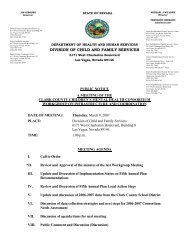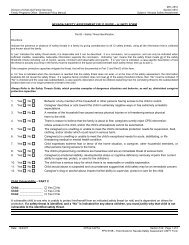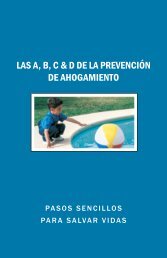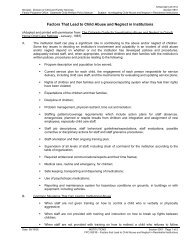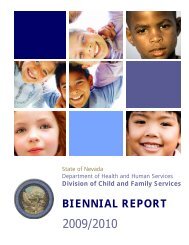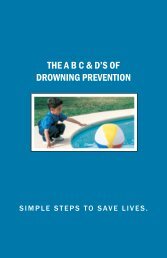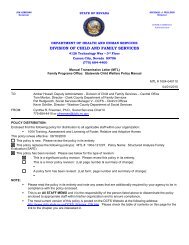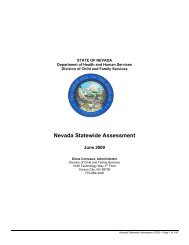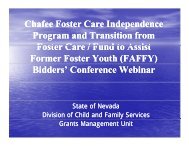STATE OF NEVADA - Division of Child and Family Services
STATE OF NEVADA - Division of Child and Family Services
STATE OF NEVADA - Division of Child and Family Services
You also want an ePaper? Increase the reach of your titles
YUMPU automatically turns print PDFs into web optimized ePapers that Google loves.
Agency Level Policies: In addition to the above statewide policies, WCDSS updated their local policy manual related to<br />
well-being, including Section 18 <strong>and</strong> 24. Section 18, Placement <strong>Services</strong> was revised to incorporate statutory changes to<br />
relative relationships <strong>and</strong> was distributed to staff. Section 24, Visitation was revised due to an initiative through the <strong>Family</strong><br />
Court Senior Model Court. Training classes regarding new practices was developed by the policy team including foster<br />
parents, the public defender <strong>and</strong> agency staff. Training was delivered to a joint audience <strong>of</strong> foster parents <strong>and</strong> child<br />
welfare staff. In addition, a Psychotropic Medication policy was drafted <strong>and</strong> submitted for approval with an anticipated<br />
completion date <strong>of</strong> June 2010. Finally, an administrative policy regarding dangerous situations in the <strong>of</strong>fice was revised<br />
by the Staff Advisory Committee (SAC) <strong>and</strong> approved by WCDSS management. Training is being researched for<br />
implementation.<br />
The DCFS-Rural Region is in the process <strong>of</strong> developing a Rural Region specific child welfare policy <strong>and</strong> procedure<br />
manual. A draft, including applicable permanency policies, has been developed <strong>and</strong> is currently under review by the<br />
Social <strong>Services</strong> Managers in the Rural Region.<br />
For CCDFS, most policies were developed prior to July 1, 2009. However, implementation <strong>of</strong> several policies occurred in<br />
the last fiscal year. The first policy is entitled Out-<strong>of</strong>-Home (Permanency) <strong>Services</strong>. This was implemented on August 20,<br />
2009 <strong>and</strong> the department is in phase one <strong>of</strong> implementation. In October <strong>of</strong> 2009, the Department implemented an<br />
Instructional Memo for Out-<strong>of</strong>-Home staff regarding requesting child support for parents <strong>and</strong> the Report <strong>and</strong> Dispositional<br />
Hearing. In March <strong>of</strong> 2010 the memo was revised <strong>and</strong> new training was provided to staff. An Independent Living policy<br />
<strong>and</strong> procedure was developed in October <strong>of</strong> 2009 <strong>and</strong> the Department is in the process <strong>of</strong> developing training to<br />
implement the policy in September 2010. Finally, a Clinical <strong>Services</strong> policy was developed <strong>and</strong> implemented with an<br />
effective date <strong>of</strong> October 21, 2009.<br />
Training<br />
Beginning in October 2009, several stakeholders participated in a “training <strong>of</strong> trainers” workshop on the Ansell Casey Life<br />
Skills Assessment. Participants included members from CCDFS, workers from the <strong>Family</strong> Recourse Centers (FRC) in<br />
Pahrump, <strong>and</strong> FPO independent Living staff. Approximately 10 child welfare staff are now trainers <strong>of</strong> Ansell Casey Plus.<br />
CFSP Goals <strong>and</strong> Objectives for <strong>Child</strong> <strong>and</strong> <strong>Family</strong> Well-Being<br />
In the 2010-2014 CFSP, each performance indicator was given an overall goal <strong>and</strong> one or more objectives. Each <strong>of</strong> these<br />
objectives are to be assessed through the development <strong>of</strong> data reports from the UNITY system or through qualitative<br />
means such as surveys or qualitative case reviews. This process is under development <strong>and</strong> will not be finalized until the<br />
new Program Improvement Plan is approved. UNITY reports are under development <strong>and</strong> are not planned to be<br />
completed until the spring <strong>of</strong> 2011. Therefore, for the purposes <strong>of</strong> the SFY 2010 APSR report, the data from the CFSR<br />
conducted in August 2009 is being used to show performance on each performance indicator as a whole. Where reports<br />
do currently exist, those reports are also included to address individual objectives. Unless otherwise noted, all objective<br />
reports are under development at this time. Figure 13 shows a brief graph <strong>of</strong> how Nevada rated statewide in the 2009<br />
CFSR on individual performance indicators for child <strong>and</strong> family well-being.<br />
Nevada APSR – SFY 2010<br />
Page 39 <strong>of</strong> 108



